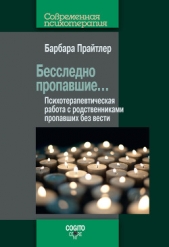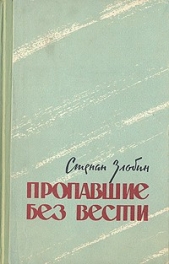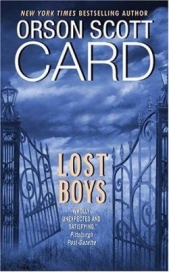Бесследно пропавшие Психотерапевтическая работа с родственниками пропавших без вести

Бесследно пропавшие Психотерапевтическая работа с родственниками пропавших без вести читать книгу онлайн
Внимание! Книга может содержать контент только для совершеннолетних. Для несовершеннолетних чтение данного контента СТРОГО ЗАПРЕЩЕНО! Если в книге присутствует наличие пропаганды ЛГБТ и другого, запрещенного контента - просьба написать на почту [email protected] для удаления материала
Freud S. (1918). Reflections on War and Death. N. Y.: Moffat, Yard and Co.
Freud S. (1961): Die Traumdeutung. Frankfurt a. M.: Fischer.
Freud S. (1994). Das Unbehagen der Kultur und andere Kulturtheoretische Schriften. Frankfurt a. M.: Fischer
Garcia S. N. (2001). Den Tod erinnern, um weiterleben zu können. In Medico International (Ed.). Die Gewalt überleben: Psychosoziale Arbeit im Kontext von Krieg, Diktatur und Armut. Frankfurt a. M.: Mabuse, 37–42.
Goldmann J., Guger J. (Eds) (2006). Vermisst & Gefunden. Ein Schicksal – viele Geschichten. Salzburg: A & M Weltbild.
Greene W. A. (1958). Role of a Vicarious Object in the Adaptation to Object Loss. Psychosomatic Medicine, XX (5), 344–350.
Greenson R. R. (1978). On Transitional Objects and Transference // Grolnick S. A. et. al (Eds). Between Reality and Fantasy. Transitional Objects and Phenomena. N. Y.: Jason Aronson.
Grolnick S. A. et. al (Ed.) (1978). Between Reality and Fantasy. Transitional Objects and Phenomena. N. Y.: Jason Aronson.
Hackl E. (1997). Sara und Simón. Eine endlose Geschichte. Zürich: Diogenes
Halpern J., Tramontin M. (2007). Disaster. Mental health. Theory and Practice. Belmont: Thomson.
Hamber B. (1995). Do Sleeping Dogs Lie? The Psychological Implications of the Truth and Reconciliation Commission in South Africa. Paper presented at Seminar № 5; Centre for the Study of Violence and Reconciliation, Johannesburg 26.7.1995.
Hamilton I. M. et. al. (Ed.) (n. g.). Family Separation and Reunion. Families of Prisoners of War and Servicemen Missing in Action. Washington, D. C: U. S. Government Printing Office.
Haney A. et. al. (1997). Spontaneous Memorialization: Violent Death and Emerging Mourning Ritual // Omega – Journal of Death and Dying, 35 (2), 159–171.
Hassel F. (Ed.) (2003). Der Krieg im Schatten. Russland und Tschetschenien. Frankfurt a. M.: Edition Suhrkamp.
Haviland C. (2013). Sri Lanka Matale Mass Grave «dates from the late 1980». http://www.bbc.co.uk/news/world-asia-21964586 (accessed on 14.5.2013)
Heidelberger-Leonard I. (1996). Ruth Klüger weiter leben. Eine Jugend. Oldenbourg Interpretation. München: Oldenbourg.
Herman J. (1992). Trauma and Recovery. The aftermath of violence – from domestic abuse to political terror. N. Y.: BasicBooks.
Hernandez V (2012). Argentine mothers mark 35 years of marching for justice. 28.4.2012 http://www.bbc.co.uk/news/world-latin-america-17847134.
Heyl M., Schreier H. (Eds) (1994). Die Gegenwart der Schoah. Zur Aktualität des Mordes an den europäischen Juden. Hamburg: Krämer.
Homer (1979). Odyssee. Reihe: Die bibliophilen Taschenbücher. Dortmund: Harenberg Kommunikation.
Horowitz M. J. (1985). Disasters and Psychological Responses to Stress. Psychiatric annals, 15 (3), 161–167.
ICMP (2008). Bosnia and Herzegovina. http://www.ic-mp.org/icmp-worldwide/southeast-europe/bosnia-and-herzegovina/ (accessed on 9.8.2012)
ICMP (2012). U. S. Helsinki Commission Hearing: «Healing the wounds of conflict and disaster: Clarifying the Fate of Missing Persons in the OSCE»: Intervention by her Majesty Queen Noor, ICMP Commissioner. http://www.ic-mp.org/wp-content/uploads/2012/02/icmp-dg-415-4-doc.pdf (accessed on 8.8. 2012)
ICRC. Protocol Additional to the Geneva Conventions of 12 August 1949, and relating to the Protection of Victims of International Armed Conflicts (Protocol I), 8 June 1977. http://www.icrc.org/applic/ihl/ihl.nsf/Treaty.xsp?action=openDocument&documentId=D9E6B6264D7723C3C12563CD002D6CE4 (accessed on 12.7.2013)
Independent Commission on International Humanitarian Issues (1986). Disappeared! Technique of terror: a report. London-N. J.: Zed Books Ltd.
INFORM (1993). Annualreport. Colombo: Inform.
International Commission on Missing Persons (2004). ICMP announces positive results of the Outreach Campaign intended to inform family members of missing persons. Press Release, 18.8. 2004.
Irmler D. (2001). «Mein Zimmer hier heißt Schmerz». Überleben und Leben – Systemische Therapie mit schwerst traumatisierten minderjährigen Flchtlingen // Rotthaus W. (Ed.). Systemische Kinder– und Jugendlichenpsychotherapie. Heidelberg: Carl-Auer-Systeme, 446–461.
Jelin E. (1994). The Politics of Memory. The Human Rights Movement and the Construction of Democracy in Argentinia. Latin American Perspectives, 81, 38–58.
Kampusch N. (2010). 3096 Tage. Berlin: List
Kast V. (1982). Trauern. Phasen und Chancen des psychischen Prozesses. Stuttgart, Berlin: Kreuz Verlag.
Kauffman J. (1993-94). Dissociative Functions in the Normal Mourning Process // Omega. 28 (1), 31–38.
Keilson H. (1979). Sequenzielle Traumatisierung bei Kindern. Stuttgart: Enke.
Keilson H. (1992). Sequential Traumatisation in Children: A clinical and statistical follow-up study on the fate of the Jewish war orphans in the Netherlands. Jerusalem: The Magnes Press.
Kestenberg J., Brenner I. (1986). Children who survived the Holocaust. The Role of Rules and routines in the Development of the Superego. International Journal of Psycho Analysis, 67, 309–316.
Kestenberg J., Brenner I. (1996). The Last Witness. The Child Survivor of the Holocaust. Washington-London: American Psychiatric Press, Inc.
Kernberg O. (1984). The couch at sea: psychoanalytic studies of group and organizational leadership // Int. J. Group Psychotherapy. 34, 5-23.
Kernjak F. (2002). Trauma und Exhumierungen. Am Beispiel Guatemala. Wien: Diplomarbeit an der Fakultät für Human– und Sozialwissenschaften.
Kinzie J. D., Boehnlien J. K., Sack W. H. (1998). Teh Effects of Massive Trauma on Cambodian Parents and Children // Danieli Y. (Ed.). An International handbook of Mulitgenerational legacies of Trauma. N. Y.: Plenum Press. 211–224.
Kinzie J. D. (1994). Countertransference in the Treatment of Southeast Asian Refugees // Wilson J. P., Lindy. J. D. (Eds). Countertransference in the Treatment of PTSD. N. Y.-London: Guilford Press. 249–262.
Kleinmann A., Das V., Lock M. (1997). Social Suffering. Berkely: University California Press.
Klüger R. (1994). weiter leben. Eine Jugend. München: Deutscher Tasc henbuc hverlag.
Koepsel R. (2011). Mothers of the Plaza de Mayo: First Responders for Human Rights. Case-Specific Briefing Paper. Humanitarian Assistance in Complex Emergencies. University of Denver.
Kogan I. (2011). Mit der Trauer kämpfen. Schmerz und Trauer in der Psychotherapie traumatisierter Menschen. Stuttgart: Klett-Cotta.
Kordon D. R. et. al. (1988). Psychological Effects of Political Repression. Buenos Aires: Sudamericana/Planeta.
Kraushaar W. (1994). Die Affäre Auerbach. Zur Virulenz des Antisemitismus in den Gründerjahren der Bundesrepublik // Schreier H., Heyl M. (Eds). Die Gegenwart der Schoah. Zur Aktualität des Mordes an den europäischen Juden. Hamburg: Krämer. 195–218.
Krishner L. A. (1994). Trauma, The Good Object and The Symbolic: A Theoretical Integration // International Journal for PsychoAnalysis, 75, 235–242.
Krystal H. (Ed.). (1968). Massive Psychic Trauma. N. Y.: International University Press
Krystal H. (1981). The Aging Survivor of the Holocaust. Integration and Self-Healing in Posttraumatic States // Journal Geriatric Stress. 14, 165–189.
Kurier (2004). Hunderte Zuwanderer im Meer ertrunken. Kurier, 6.1.2004, 8.
Kübler-Ross E. (1969). On Death and Dying. N. Y.: Macmillon.
Lagos D., Kordon D, Edelman L, Kersner D. (n. g.). Argentina: Our Experience in Rehabilitation Work with Relatives of Desaparecidos and other Victims of Political Repression. Buenos Aires: EATIP, Eigenverlag.
Langer L. (1997). Social Suffering and Holocaust Atrocity // Kleinmann A., Das V., Lock M. (Eds). Social Suffering. Berkely: University California Press, 47–66.
Laub D. (1996). The empty Circle: Children of Survivors and the Limits of Reconstruction // Japa. 46/2, 507–529.























